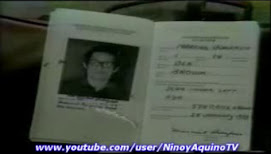Prof. Ed Aurelio "DING" Reyes launched his book "Demands of Dignity," at IAME. Prof. Ding is shown below signing a copy of his book.

Here, Prof. Ding poses for a picture with friends, among them no less than Dr. Emmanuel T. Santos, aka Noli Santos (as in Noli Santos International Tower, that's where the IAME is located).

In his Introduction, Prof. DING explains best the rationale for his present volume:
"Ten years ago, on the occasion of the Golden and Centennial anniversaries of UDHR [Universal Declaration of Human Rights] and TP [Treaty of Paris of 1898], respectively, an active network promoting a keen sense of history among the peoples of the Philippines spearheaded together with the largest alliance of human rights advocates in the country a human rights-oriented and historically-mandated project in the form of a '1998 Philippine Declaration of Felicitation and Protest.'
Through the efforts of Kamalaysayan and the Philippine Alliance of Human Rights Advocates (PAHRA) this was formulated and subsequently signed by over 300 history-oriented educators, human rights [advocates] and students from all over the country, and copies were delivered to the respective embassies of Spain and the United States, the office of the United Nations resident representative in the Philippines, and some other official addressees, including the embassy of France.
This 1998 Philippine Declaration expresses, among others, a demand for an official apology from Spain and the same from the US. We got a response from the Spanish ambassador, and his makes for a very interesting reading.
Now, a full decade later, Kamalaysayan is launching as a campaign project a deeper and broader discourse on the contents of this 1998 Declaration, covering the effort to foster a deeper understanding and firmer grasp of both international documents along with their respective implications and consequences, and elaborating on the items for which we have earlier aired demands for apology.
To jumpstart this campaign and provide an intial folio of materials for circulation and discussion, this writer was tasked to put together this book, one of the thickest and most well-researched among his two dozen or so published works, full-titled, Demands of Dignity: Developing the Discourse on the Philippine December 10th Declaration, a Decade After. This book comes out in standard hard-copy version of about 180 pages, and in electronic full and popular versions mainly for an international audience.
The first two chapters tackle why the UDHR and the TP are, respectively, "a cause for celebration" and "a cause for indignation." The third chapter elaborates in detail the bases of the demands for Spanish and American official apology to the Filipino people and to Humanity, and the last two chapters respond to the Spanish written response and to the American non-response to the 1998 Declaration.
We have been asked why we still bother with these two very old documents 'just because they got signed on the same date.' Actually, these two are much more closely related than that -- they are mutually relevant. And they form part of our continuing past, for better and for worse. They are part of the History of Humankind, of all of us. They are both covered by the Demands of Human Dignity."
Mr. Max de Mesa, Chairperson of PAHRA, wrote the foreword. This is what he says:
"The author challenges our sense of time in relation to human rights. How far can we appropriately and effectively reach out from the past to correct the present and to work together for common dignity in the future?
The people' struggles inform and reshape the human rights discourse not only its language but its content as well. To be effective and relevant, human rights defenders from the concerned parties must thus engage in solidarity with those who struggle for their dignity and rights. The people in turn must engage the duty-holders, as well as all claim-holders of human rights to ensure that they all enjoy the full implementation of these rights and obtain dignity for all concerned."
Dr. Noli Santos wrote:
"Demands of Dignity by Ed Aurelio C. Reyes is a fresh historical contribution to the mainstream radical intellectual tradition of Philippine struggle for recognition of human dignity, independence, freedom and democracy."
He ended his Prologue, thus:
"With the hindsight of history, we call on President Obama to issue a statement of apology to the Filipino people and the Republic of the Philippines to show to the world that America still stands by its basic values of respect for human dignity, life, liberty, freedom, truth, justice and pursuit of happiness. We also request President Obama to order the immediate return of the historic Bells of Balangiga taken by the American forces and are still being kept in the US after more than 100 years. This bell is part of the natural treasure of the Philippines."
To me, Demands of Dignity is unfolding, interactive history -- this is a theme that I will be returning to from time to time.
It summons us as a nation to keep confronting our past, to move on beyond that past when we have learned its more relevant lessons to forge a future that beckons with peace, justice, progress and dignity.





I know him! How is he? Where does he work now? I haven't seen in in awhile! Say hi for me if you see him again. Just tell him Earth and he knows :)
ReplyDeleteI'll say hi to Ding for you Earth and tell him to visit your blogs. I think he's doing just fine.
ReplyDeleteThe best thing about Prof. Ding is that he doesn't take himself seriously. When you call this confirmed intellectual "Prof.," he'll immediately shoot back and say, "Ding Reyes, lang! Walang Prof."
All-around nice guy, I'd say.
Dati kasi tawag namin sa kanya Sir Ed nagbago na pala sya ng screen name ahahahaha. Hey thanks for following my blog and I'll make a post about the Monumento thing today.
ReplyDeleteI think the explanation is that when your age difference is significant, as in your case, you call him Sir Ed. When it's not, as in mine, we call him Ding. Baka ganun!
ReplyDeleteI checked out your post (Of Patriotism, the Bonifacio Monument and Public Holidays") and left a comment. You put a nice spin to it. Great work! Thanks!
Interesting post. Did Spain apologized?.
ReplyDeleteI had once had a classmate form Pakistan who history since we were discussing history in my danish class. She said the future is what matters.
I disagree because to better understand the culture and norms why our society is behaving in the present time and with that understanding we are better equip to face the future.
I hope my message will come through now.
Regards
Ana and Earth, to the question "Did Spain apologize?," this is part of what Prof. Ding Reyes had to say in Demands of Dignity (page 119):
ReplyDelete"We did not expect a response from any of the official addressees of our 1998 Declaration, which we had made sure to deliver on that doubly-significant day, December 10, 1998. For this reason, we were very pleasantly surprised to get, a few weeks later, a reply coming from no less than the then Ambassador of Spain, His Excellency, Ambassador Delfin Colime, printed on official embassy stationery and delivered to the office address of Kamalaysayan.
The content of that letter, of one very important sentence in it, was the bigger and more pleasant surprise. It acknowledged the sale of the Philippines to the United States as a "terrible mistake" on the part of Spain. That sounded close to an apology that our Declaration had been seeking. And judging from the overall positive tone of this official communication, that might have really been the intention."
This is very interesting stuff. I promise to come back and post a longer comment here. I have to run and submit a letter of concern to the Deped.
See both of you soon!
moncler
ReplyDeleteyeezy boost 350 v2
kyrie 6
cheap jordans
jordan shoes
off white x jordan 1
golden goose sneakers
supreme
supreme outlet
goyard handbags